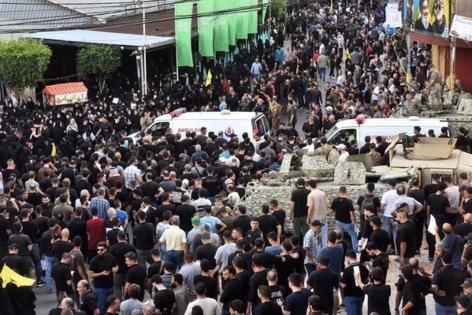Walkie-talkies blow up in Lebanon in new attack on Hezbollah
Published in News & Features
Lebanon was hit with a fresh wave of exploding telecommunications devices including walkie talkies a day after 12 people were killed and thousands injured in a series of similar blasts.
Nine more people died and at least 300 were wounded on Wednesday in Beirut and surrounding areas, the Health Ministry said. The new round of detonations coincided with several funerals organized by the militant group Hezbollah for members killed in the attack the previous day, with hundreds of people taking part in the processions.
Hezbollah and the Lebanese government both blamed Israel for the audacious Tuesday assault, which made headlines across the world in part due to the unusual nature of the technologically advanced operation. At least 3,000 people were injured, mostly Hezbollah members, when a large number of pagers exploded almost in tandem, raising concerns about an escalation of violence across the Middle East.
Israel hasn’t confirmed or denied responsibility for sabotaging the devices.
On Wednesday, Lebanon’s Civil Defense said firefighters were called to several homes in various parts of the country including Beirut neighborhoods. In the southern town of Nabatiyeh, they put out fires in 60 homes, 15 cars and dozens of motorcycles as a result of exploding telecom devices, as well as two items for detecting fingerprints.
The Lebanese army asked people to make way for medics in places experiencing “security incidents,” as television footage showed those affected lying on the ground in several areas.
Hezbollah said Tuesday it would retaliate to the alleged attacks, which came after almost a year of cross-border rocket fire with Israel in tandem with the ongoing conflict with Hamas in Gaza.
Iran trains and finances both Hezbollah and Hamas, considered terrorist organizations by the U.S., and Tehran added its voice to those blaming Israel for the pager explosions.
Lebanese Information Minister Ziyad Makari told Al-Jazeera TV that his country didn’t fear Hezbollah’s response, but “we fear Israel and its crimes.”
“What happened is a new kind of warfare and investigations are ongoing by the state and Hezbollah,” he said. “There will certainly be coordination between the state and the group to investigate, because the attack is on Lebanese sovereignty as a whole.”
Tens of thousands of civilians have had to flee their homes in northern Israel and southern Lebanon amid the cross-border missile and drone strikes. Hundreds of Hezbollah fighters have been killed and around 50 Israelis.
Israeli Prime Minister Benjamin Netanyahu told one of U.S. President Joe Biden’s senior Middle East envoys this week that an all-out conflict between Israeli forces and Hezbollah is becoming more likely. Diplomacy has stumbled and war may be the only way to stop Hezbollah’s attacks and enable Israeli civilians to return to the northern border area, he told Amos Hochstein.
The Israeli cabinet agreed on Monday to make the return of those displaced people an official war objective.
The U.S. is trying to calm the situation and Hochstein, who handles the Israel-Lebanon file for the White House, told Netanyahu that a deeper conflict is not in Israel’s interest and would only risk a region-wide war, Bloomberg reported.
In an indication an Israeli offensive on Lebanon could be in the works, the general in charge of the Israel Defense Forces northern battalions, Ori Gordin, inspected an large-scale drill, according to a military statement. “Troops here are at peak readiness for any mission that may be assigned,” it quoted him as saying.
___
©2024 Bloomberg L.P. Visit bloomberg.com. Distributed by Tribune Content Agency, LLC.







Comments